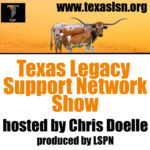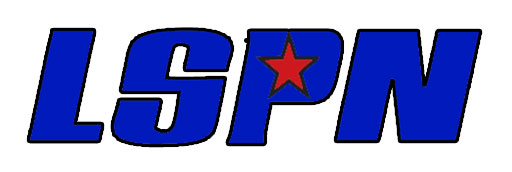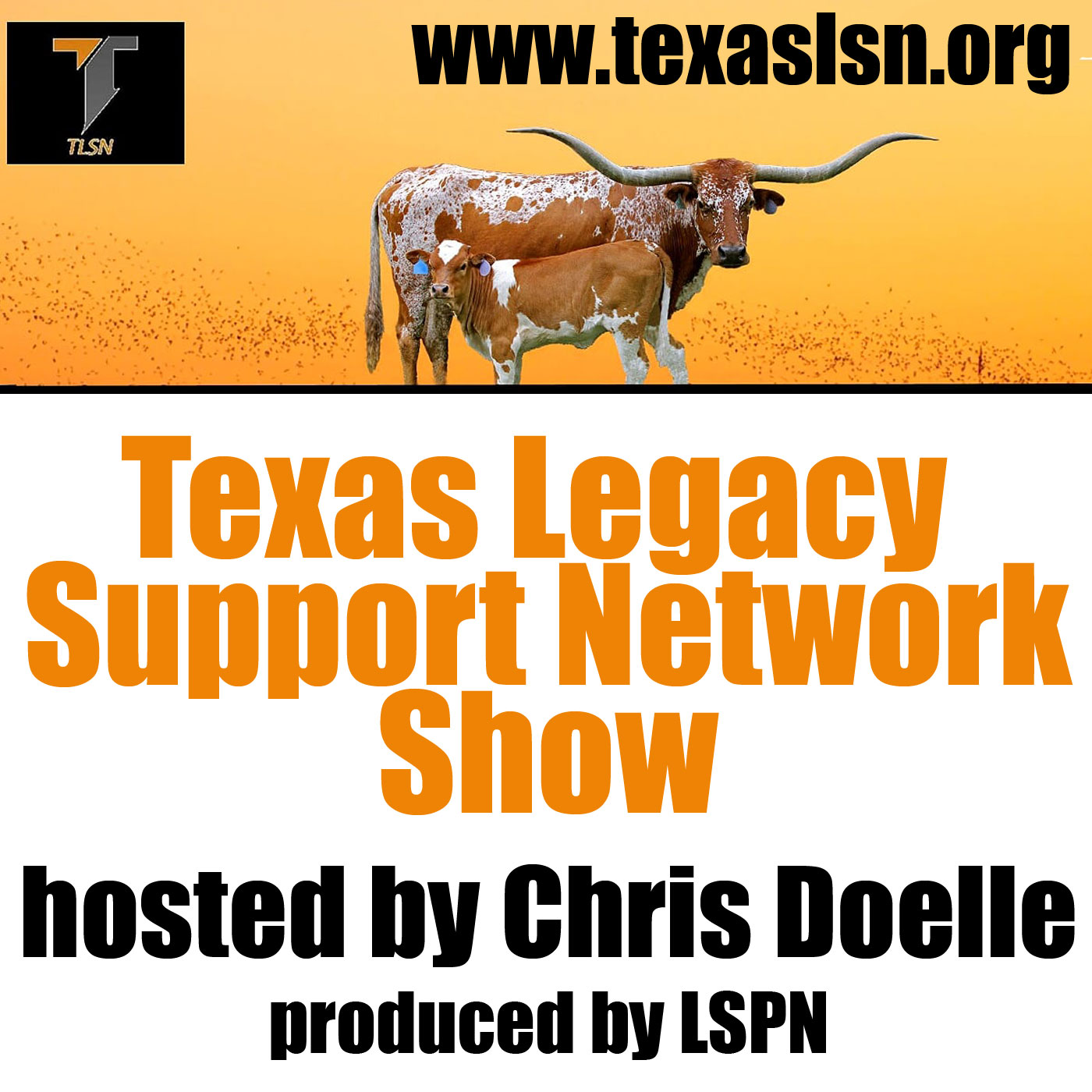
David Lowery
Season 5 – Episode 2
Welcome to another exciting episode of the Texas Legacy Support Network Show! Hosted by Chris Doelle, TLSN is a 501c3 Texas nonprofit corporation dedicated to sharing the history of all Longhorn Sports and offering temporary financial support to former Longhorn student athletes facing hardship.
In this episode, Chris hands the mic over to the one and only Larry Carlson, who is “fired up” to introduce a true Longhorn legend.
Featured Guest: David Lowery
Larry Carlson welcomes David Lowery, one of the “great hitters in Longhorn baseball history”. David played for the Longhorns in 1989, when they were runners-up in the College World Series, and again in 1990. He went on to play professionally and is remembered as an all-time great hitter for the University of Texas.
Key Highlights from the Conversation:
- Unbelievable Hitting Prowess: Larry kicks off the conversation by highlighting David’s remarkable .520 (or .525 according to some reports) batting average in junior college at Panola Junior College in 1988, where he was the national batting champion. David humbly acknowledged his hitting ability but emphasized the many other great hitters at Texas. He described his junior college season as a year where he “saw the ball every day” and experienced an unusual consistency, avoiding the typical highs and lows of a baseball season.
- Hitting at Texas: David continued his strong hitting at Texas, batting better than .350 in 1989. He agreed with Larry’s sentiment that hitting a baseball is one of the hardest things in sports, emphasizing the challenge of hitting a moving object at high speeds.
- The Art of Hitting: David shared his philosophy on hitting, highlighting the importance of hand-eye coordination, the “rule of 10,000” (repetition in the batting cage), and pitch selection. He stressed the need for confidence to lay off pitches and described his approach of looking for a fastball until there were two strikes.
- Football Background: Growing up in Southeast Texas, David played football, primarily as a cornerback and on special teams. He also played various offensive positions, even tight end in one game against a strong West Orange-Stark team, demonstrating his versatility and willingness to do what it took to help his team.
- The 1989 College World Series Run: The 1989 Longhorn team faced pitching injuries and some misfortune during the season but rallied to make a strong run in the NCAA tournament. David mentioned the strength of the Southwest Conference at the time, with Arkansas and Texas A&M also being formidable teams. He highlighted the emergence of Brian Deair as a key left-handed pitcher who stabilized the staff alongside Kirk Dressendorfer.
- Controversial Championship Format: David and Larry discussed the controversial format of the 1989 College World Series, where the championship was decided by a single game due to television scheduling demands from CBS. Despite losing only one game in the entire NCAA tournament, the Longhorns finished second after losing the final game to Wichita State, who had lost twice.
- The Championship Game: David recalled the decision to start Scott Bryant, primarily an offensive player who had not pitched much since high school, in the championship game due to pitching depth issues. He reflected on a strategic thought of potentially saving their ace, Kirk Dressendorfer, for the championship game by using another pitcher against LSU’s Ben McDonald in an earlier matchup, which they surprisingly won decisively. David also remembered the cold and overcast weather conditions on the day of the championship game.
- All-College World Series Honors: David was named to the All-College World Series team in 1989, alongside Longhorns Craig Newkirk, Scott Bryant, and others. Wichita State had the most players on the team, with a few from LSU as well.
- Professional Baseball Career: David played several years of professional baseball with the Rangers and Mets organizations, as well as in independent leagues in Winnipeg, Canada, and Lubbock, Texas. He described his minor league experience as living the movie Bull Durham, with long bus rides and early morning flights. He even served as a player-manager for a period.
- Versatility on the Field: David played various infield positions throughout his career, including shortstop (his high school position), second base (primarily at Texas), first base (at Texas), and third base (in professional ball). He even played some outfield.
- Lessons from Coach Cliff Gustafson: David shared valuable lessons learned from the legendary Coach Cliff Gustafson. He emphasized the team’s resilience in the face of adversity in 1989. He highlighted Coach Gus’s deep understanding of baseball tactics and his early adoption of analytics, keeping detailed books on inner squad game statistics from 1968 to 1996 to inform strategic decisions. Coach Gustafson was also obsessive about fundamental baseball, particularly moving runners and scoring from third base with less than two outs.
- Impressions of Coach Jim Schlossnagle: David has positive early impressions of the Jim Schlossnagle era at Texas, recognizing his reputation as a top baseball CEO who knows how to build a successful program by recruiting well and hiring excellent coaches. He is optimistic about the future of Longhorn baseball under Schlossnagle.
- Exciting Current Longhorn Players: As a fan watching from his suite, David enjoys watching Lebarron Johnson Jr. (“Blue”) for his traditional swing. He is also impressed with Jalin Flores, the second baseman from Arizona State, for his competitive approach and baseball IQ. He also mentioned a talented freshman switch hitter, the center fielder (who is strong defensively and improving offensively), and Dylan Campbell, who has developed into a key player. David also praised Porter Brown (“Galvan”).
- Off-Field Hangouts: David reminisced about going to Dallas Nightclub and eating at Players hamburger place near campus during his time at Texas.
- Staying Connected: David remains in touch with many of his former Longhorn teammates and other athletes from his era.
- Current Ventures: David is involved in an artificial turf company and real estate investing. He also enjoys mentoring younger individuals and is looking forward to contributing to the Texas Legacy Support Network as a new board member.
David expressed his enthusiasm for joining the TLSN board and his commitment to helping in any way he can, recognizing it as a “great call” and “the right thing to do”. He also shared his enjoyment of Larry’s historical Longhorn sports stories.
Support the Texas Legacy Support Network:
If you’d like to contribute to the collection of these amazing oral histories and support former Longhorn student athletes in need, please reach out to Billy Dale at BillyDale1@gmail.com.
Podcast Production Services:
For those interested in starting their own podcast, Fresh Media Works offers comprehensive services to help you grow your brand and message. Visit freshmediaworks.com or call 713-269-4620.
Thank you for tuning in to the Texas Legacy Support Network Show! Join us next time for more stories from the rich history of Longhorn Sports.
Texas Legacy Support Network
Available on these fine podcast sources and more!
Texas Legacy Support Network
The Texas Legacy Support Network is a 501 c3 non-profit formed to help former University of Texas athletes. The funds raised by TLSN are used to offer temporary financial support to former qualifying student-athletes, managers, trainers, and their immediate family’s.
To help share the stories of the folks who made UT Athletics history:
- email billydale1@gmail.com
- phone 972-672-9071
Call the feedback line 713-568-6361
produced by Fresh Media Works http://www.freshmediaworks.com



